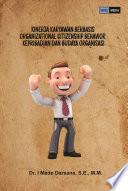
KINERJA KARYAWAN BERBASIS ORGANIZATIONAL CITIZENSHIP BEHAVIOR, KEPRIBADIAN DAN BUDAYA ORGANISASI
Buku dengan judul Kinerja Karyawan Berbasis Organizational Citizenship Behavior, Kepribadian dan Budaya Organisasi dapat selesai disusun dan berhasil diterbitkan. Walaupun jauh dari kesempurnaan, tetapi kami mengharapkan buku ini dapat dijadikan referensi atau bacaan serta rujukan bagi akademisi ataupun para profesional. Sistematika penulisan buku ini diuraikan dalam lima bab yang memuat tentang kinerja karyawan dan berbagai jenisnya merupakan faktor yang berkontribusi signifikan terhadap Organizational Citizenship Behavior, berikutnya didalam buku ini dibahas dengan mendalam tentang teori kepribadian, budaya organisasi, faktor yang dapat mempengaruhi OCB dan faktor yang mempengaruhi kinerja karyawan.
- ISBN 13 : 6238876328
- ISBN 10 : 9786238876327
- Judul : KINERJA KARYAWAN BERBASIS ORGANIZATIONAL CITIZENSHIP BEHAVIOR, KEPRIBADIAN DAN BUDAYA ORGANISASI
- Pengarang : I Made Darsana,
- Kategori : Business & Economics
- Penerbit : CV. Intelektual Manifes Media
- Bahasa : id
- Tahun : 2023
- Halaman : 134
- Google Book : https://play.google.com/store/books/details?id=d0vhEAAAQBAJ&source=gbs_api
-
Ketersediaan :
... pada abad ke - 19 saat para petani ingin melepaskan dirinya dari jeratan para rentenir yang memberikan pinjaman modal kerja dengan bunga tinggi . Saat ini , melalui Undang - undang Nomor 7 Tahun 1992 tentang Perbankan , yang selanjutnya ...









